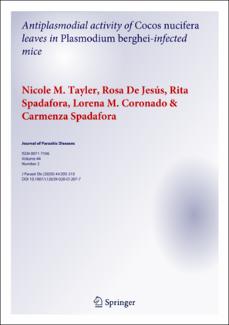| dc.contributor.author | Ngo, Kurt D. | |
| dc.contributor.author | Plazaola, Carlos | |
| dc.contributor.author | González, Guadalupe | |
| dc.contributor.author | Spadafora, Carmenza | |
| dc.contributor.author | Zambrano, Mayteé | |
| dc.date.accessioned | 2020-05-28T23:14:06Z | |
| dc.date.available | 2020-05-28T23:14:06Z | |
| dc.date.issued | 2019-11-25 | |
| dc.identifier.other | 10.23919/EuMC.2019.8910930 | |
| dc.identifier.uri | http://repositorio-indicasat.org.pa/handle/123456789/34 | |
| dc.description | Malaria is a disease that affects the world, caused by the parasite Plasmodium which resistance is emerging to medications that usually control it. Therefore, it is essential to seek alternative treatments like this one, our multidisciplinary work pursues, a variable radiofrequency energy at 2.45GHz to decrease the growth of parasitemia in blood. Experiments are carried on in vitro samples of blood infected with Plasmodium falciparum radiated in a microwave cavity controlling the rise of the temperature. The thermal properties of samples infected at different stages of the parasite are analyzed separately without using microwave radiation for thermal characterization. The energy absorbed by the infected sample is estimated using the specific heat of blood with Plasmodium falciparum. For thermo energetic control, radiation is applied in different duty cycles for a determined amount of energy observing an alteration which it is accentuated in energy radiation with more duty cycles and less power in watts. Our preliminary results show that thermo-energetic control system produce alterations in the growth of parasitemia levels. Furthermore, we confirm that using microwave radiation has a negative effect in the growth of Plasmodium falciparum. There is also, an increment of the specific heat as the parasitemia percentage increase in late stage parasites because in schizonts the Plasmodium falciparum changes the biophysical properties of the red blood cell. This thermo-energetic characterization could be transferred to in vivo samples, with the necessary adjustments for future applications. | en_US |
| dc.description.abstract | Malaria is a disease that affects the world, caused by the parasite Plasmodium which resistance is emerging to medications that usually control it. Therefore, it is essential to seek alternative treatments like this one, our multidisciplinary work pursues, a variable radiofrequency energy at 2.45GHz to decrease the growth of parasitemia in blood. Experiments are carried on in vitro samples of blood infected with Plasmodium falciparum radiated in a microwave cavity controlling the rise of the temperature. The thermal properties of samples infected at different stages of the parasite are analyzed separately without using microwave radiation for thermal characterization. The energy absorbed by the infected sample is estimated using the specific heat of blood with Plasmodium falciparum. For thermo energetic control, radiation is applied in different duty cycles for a determined amount of energy observing an alteration which it is accentuated in energy radiation with more duty cycles and less power in watts. Our preliminary results show that thermo-energetic control system produce alterations in the growth of parasitemia levels. Furthermore, we confirm that using microwave radiation has a negative effect in the growth of Plasmodium falciparum. There is also, an increment of the specific heat as the parasitemia percentage increase in late stage parasites because in schizonts the Plasmodium falciparum changes the biophysical properties of the red blood cell. This thermo-energetic characterization could be transferred to in vivo samples, with the necessary adjustments for future applications. | en_US |
| dc.format | application/pdf | |
| dc.language.iso | eng | en_US |
| dc.publisher | IEEE | en_US |
| dc.rights | Info:eu-repo/semantics/openAccess | |
| dc.rights | https://creativecommons.org/licenses/by/4.0/ | |
| dc.subject | microwave cavity | en_US |
| dc.subject | malaria | en_US |
| dc.subject | Plasmodium | en_US |
| dc.subject | radiofrequency radiation | en_US |
| dc.subject | thermal characterization | en_US |
| dc.subject | thermo energetic radiation | en_US |
| dc.subject | Blood | en_US |
| dc.subject | Electromagnetic heating | en_US |
| dc.subject | Temperature measurement | en_US |
| dc.subject | Diseases | en_US |
| dc.subject | Radio frequency | en_US |
| dc.subject | Water heating | en_US |
| dc.subject | bioelectric phenomena | en_US |
| dc.subject | blood | en_US |
| dc.subject | cellular biophysics | en_US |
| dc.subject | microorganisms | en_US |
| dc.subject | radiation therapy | en_US |
| dc.subject | specific heat | en_US |
| dc.subject | frequency 2.45 GHz | en_US |
| dc.subject | Plasmodium falciparum | en_US |
| dc.subject | microwave radiation | en_US |
| dc.subject | energy radiation | en_US |
| dc.title | Thermo-Energetic Study in Blood Infected with Plasmodium falciparum radiated at 2.45GHz | en_US |
| dc.type | info:eu-repo/semantics/article | en_US |
| dc.type | Info:eu-repo/semantics/publishedversion | |

